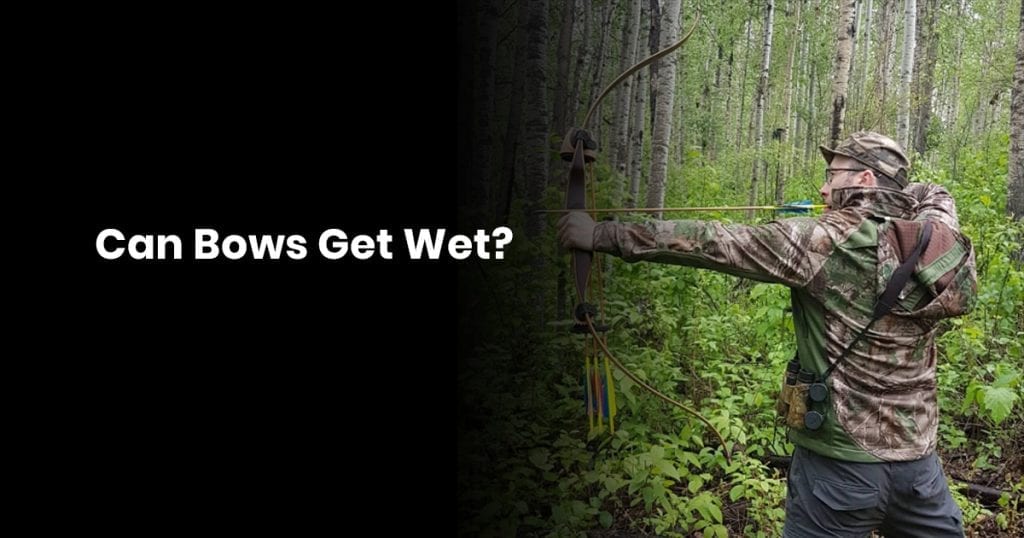Your bow isn’t designed to shoot underwater, but can it withstand some light rain here and there?
Good news, the answer is yes, but it depends on what type of bow you use.
Recurve bows are generally made out of wood and fiberglass, whereas compounds are almost always made out of aluminum and sometimes some wood.
What about Crossbows?
That’s all metal most of the time, perhaps with some wood accents.
Those are the three main bow types you’ll run into, and they each have a wildly different way that they are constructed.
Let’s just answer the question flat out and say that none of them can get wet—it’s not good.
Expansion Ruins Wood
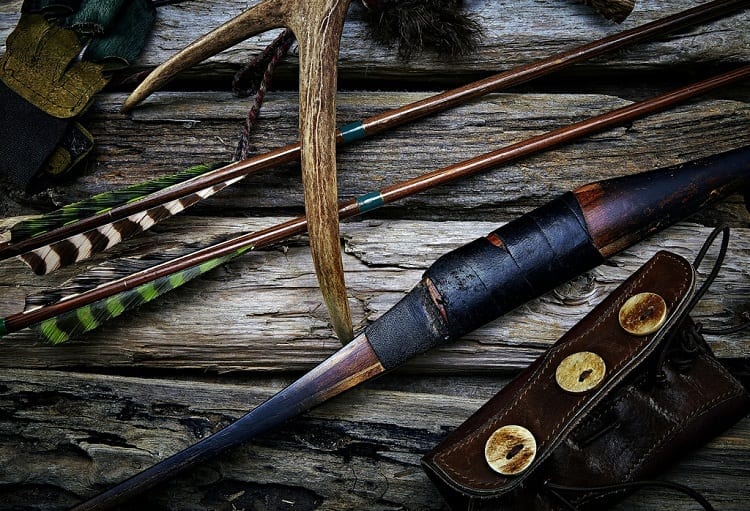
When wood gets wet, it absorbs the moisture and expands.
The ideal moisture content for wood is between 9% and 11%, which gives it some elasticity.
If the wood is too dry, it ends up being easy to snap and brittle, which is why sealants are used to lock in moisture to wood before it’s finished.
In woodworking and construction, this is a common occurrence.
You’ll notice the smooth finish your wood has to it; that comes from lacquering or using a sealant like polyurethane.
I’m not just rambling, it’s important to know because it acts as a layer that keeps that moisture in, and protects it from external moisture.
Is It Worth Bow Hunting in the Rain?
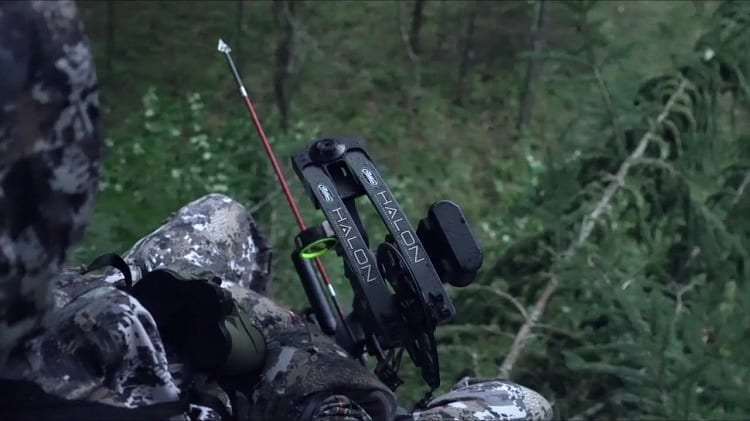
No, it isn’t .
It’s rough, because hunting during a misty morning can have most of the deer out and about, and that’s great for the hunt.
However, humidity is the enemy of your bow, no matter what material it is.
Great addition – lot of hunters with waterproof hat..
Bow hunting in the rain in theory is a good idea.
More prey come out, you’re less likely to make a sound, but you’re going to get absolutely drenched for the time that you spend outside.
Your bow likely has metal elements to it, even if the grip and limbs are mostly made out of wood.
It’s going to begin corroding. If you end up getting stuck in the rain, you should know a thing or two about handling.
Does Bow Hunting in the Rain Affect my Handling?
Yes, it’s going to make holding onto the grip a little bit harder., especially the fist time.
If you’re using a recurve bow with a wooden handle, that’s going to be tricky once you start pulling back on the string.
If your hands are too slick from the rain, you’ll feel an immediate lapse in grip and power, and that’s where you have to worry.
You either need to dry it off with a rag, or pack it up for the day.
The rain is going to affect how well you handle the bow, but if your grip is smooth enough, it might ruin the rest of the trip altogether.
Enough resistance on the bowstring and it could begin to pull the grip out of your hand.
So long as you firmly grasp the center point with a full wrap-around from your thumb, you should be okay, but it’s still a hazard to be aware of for the long time.
This doesn’t really affect your ability with a crossbow unless the trigger became waterlogged.
It’s a fairly non-complex system, and as long as you can properly cock it back, then you’re good to go.
Compounds are better to use during the rain for handling.
They require about 25% less draw weight than a recurve bow, so you won’t be providing more than 20 lbs of pressure in just about any scenario.
That reduces a lot of the risk.
Will Hunting in the Rain Affect a Bow Warranty?
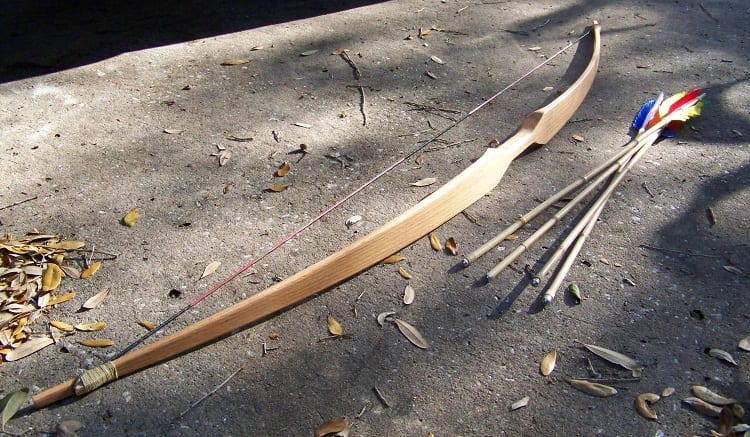
In most cases, it won’t affect it.
They’re built strong enough to withstand a bit of rain here and there, so long as you care for them properly and inspect any missing or damaged seals on all-wooden pieces.
If water damage starts to seep into the grip and in between takedown limbs, then it could damage the warranty.
When the wood swells and splits, that’s when it could be a problem.
That has nothing to do with manufacturer defects (which is basically all that those things cover), and they’ll be able to tell when and if you sent it in to be repaired/replaced.
They heavily inspect any and all reasons as to why the item malfunctioned in the first place.
If there is sustained damage that alters the capability of the bow, or they can link the failure cause to improper handling, then they will do that.
Bringing out in the rain is considered improper handling.
The warranty is there to protect them first, and you second.
They will try to find any possible problems with the bow first, so even if you only took it out in the rain once or twice, there could be visible water damage.
Does Wind Affect my Bow?
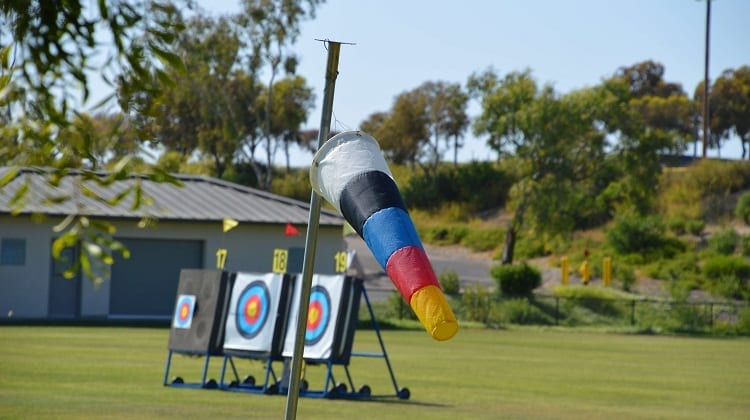
The wind would have to be absolutely extreme to actually damage your bow.
If you were holding it still against 40 MPH winds, it might warp or bend it a bit, but that’s under extenuating circumstances.
Wind in general is not going to negatively impact your bow or its performance.
That being said, the arrow is a different story.
Trying to fire in the wind is going to send your arrow off to the side and tick you off quite a bit, but your bow will be completely intact.
Materials that Degrade or Warp in the Rain
No matter what, you shouldn’t assume your bow is waterproof, but it’s important to know why.
These are the main materials you’ll see in your bows, and the ways in which they degrade.
- Wood:
- Well, you might have guessed that.
- Wood suffers from expansion due to humidity, swelling from water, and temperature.
- Temperature is usually the worst culprit, but when moisture seeps into your wooden limbs, it makes it nearly impossible to remedy the situation.
- You can dry it out, but even then you might crack or split the wood, and it’s tough to tell when the moisture content drops back down to an acceptable level.
- Metal:
- Any metal.
- Even aluminum alloy, which usually has a pretty high corrosion resistance rating.
- If metal meets water, it begins to oxidize the iron in the metal almost immediately.
- Fun fact: most consumer-grade metals used in buy-able products contain some trace or major consistency of iron.
- This is more than likely to happen if you don’t keep things nice and clear.
- Fiberglass:
- A lot of recurve bows used fiberglass-coated limbs, and there’s nothing wrong with that.
- The fiberglass itself isn’t going to warp, but if there are divots in the coating that you don’t know about, moisture will seep into the wooden limbs and begin to mold.Cramped dark space with minimal air or light getting through, mixed with being put in a case are bad combinations.
What do I do if My Compound Bow Gets Wet in the Rain?
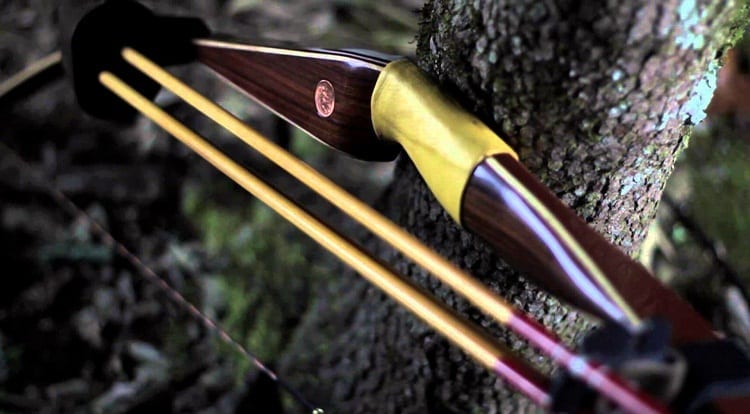
First thing is don’t panic.
You’re not going to damage it forever if you act quickly and know what to do.
This is something you can do to prevent long-term damage, though you should still try to avoid getting it wet.
There are metal rings and components in your compound bow, and they’re oiled.
Water and oil don’t mix, so the rainwater is going to interfere with them.
Wipe down the bow gently with a dry rag, and gently apply appropriate oil to the affected metal areas.
Ensure that all moisture has been removed, and leave the bow out to air dry before putting it away.
Compound bows use a lever and pulley system, and those will need to be inspected as well.
The top pulley is one of the first things that will get water in it. It may be best to unstring your bow before cleaning, and leave the strings to the side while you wait for it to dry.
Wax the string once it’s dry.
Any wax that you might have put on before your trip will be either damaged, spotty, or simply tattered by the moisture. Re wax it as soon as you can before you put it away.
Upkeep Your Bow and it Will Never Fail You
Your bow isn’t waterproof, but it can withstand a bit of shock here and there.
Just don’t dunk it entirely or submerge it, and it should be okay.
The main thing to look out for is wood expansion and fiberglass corrosion over time.
If you’re using a compound, inspect it constantly to ensure there’s no rust or degradation in its early stages.
Keep your bow in good condition, and there’s no chance that it’s going to fail you.
There are owners who have been using the same bows for thirty to forty years—that could be you.
Moisture is the enemy, keep it dry.
When engaging in bow hunting in different weather conditions, it is crucial to keep in mind several important tips.
Top Bow Hunting Tips In Wet Weather
1/ First step – it is advisable to always check the weather forecast before embarking on your hunting expedition to ensure that you are adequately prepared for any potential changes.
Being prepared for any changes in the weather reports are crucial to ensure a successful and safe hunting experience.
By staying informed about the weather conditions, hunters can make necessary adjustments and take appropriate precautions.
Hunting in wet conditions can present unique challenges.
Rain can affect visibility and make it more difficult to track and spot game.
It is important to be aware of these challenges and adapt hunting strategies accordingly.
Utilizing camouflage and scent control techniques can help minimize detection by game animals in wet conditions.
2/ It is essential to dress appropriately with the right gear for the prevailing weather conditions, layering your clothing accordingly to maintain optimal comfort and regulate your body temperature.
Layering your clothing will help maintain optimal comfort and regulate your body temperature.
By doing so, you can stay focused and perform at your best despite the weather conditions.
Wearing waterproof and moisture-wicking materials will help keep you dry and prevent discomfort.
3/ Be mindful of the direction of the wind and utilize the right moment to your advantage when positioning yourself for a shot.
This strategic approach can significantly increase your chances of a successful hunt.
Utilize the wind to your advantage when positioning yourself for a shot.
It can help mask your scent and prevent animals from detecting your presence.
The rain can wash away your scent, making it harder for animals to track you.
Use the wind to carry your scent away from your target and increase your chances of a successful shot.
4/ Considering the utilization of scent control products can be beneficial in minimizing your scent and subsequently enhancing your likelihood of a fruitful hunting experience.
By minimizing your scent, you decrease the likelihood of alerting your prey and increase your chances of a close encounter.
This can be especially beneficial when bowhunting in wet conditions, as the dampness can amplify your scent and make it easier for animals to detect you.
5/ Adapting your hunting strategy based on the specific weather conditions you are encountering.
For instance, during rainy weather, it may be advantageous to hunt near food sources where animals are more likely to congregate.
Heavy rain presents unique challenges and opportunities for bowhunters.
Adjusting your approach can increase your chances of a successful hunt and ensure your safety in the field.
6/ Exercising patience and attentiveness is crucial as animals may exhibit different behaviors in varying weather conditions.
Animals may display different behaviors due to the rain, making it important to adapt your approach.
Stay alert and observant to increase your chances of a successful hunt.
During wet weather, animals may seek shelter or change their feeding patterns.
This means you may need to adjust your hunting strategy accordingly.
Be patient and wait for the right opportunity to present itself.
7/ Practice shooting in diverse weather conditions to familiarize yourself with how it may impact your accuracy.
By practicing in the rain, for example, bowhunters can learn how the wetness may impact their bow’s performance and their ability to aim accurately.
8/ Exercise caution when encountering slippery or icy conditions that may affect your stability and footing.
Wet foliage and vegetation can obstruct your path and make it difficult to move silently and undetected.
Wet weather can affect animal behavior and movement patterns, requiring you to adapt your approach accordingly.
By studying the behavior of your target species and understanding how they respond to wet conditions, you can increase your chances of a successful hunt.
9/ Ensuring that you bring appropriate gear such as rain gear or cold weather accessories is essential to guarantee your comfort and safety throughout your hunting endeavor.
By investing in quality rain gear and cold weather accessories, you can ensure that you are well-prepared for any weather conditions that may arise.
It will keep you dry and protected from the rain, preventing discomfort and potential health issues.
10/ Pioritizing your safety and being prepared to adjust your plans if weather conditions become hazardous is of utmost importance.
Stay vigilant and make safety your top priority when bowhunting in the wet.
By adhering to these valuable tips, you can significantly enhance your chances of a successful and rewarding bow hunting experience, regardless of the prevailing weather conditions.

